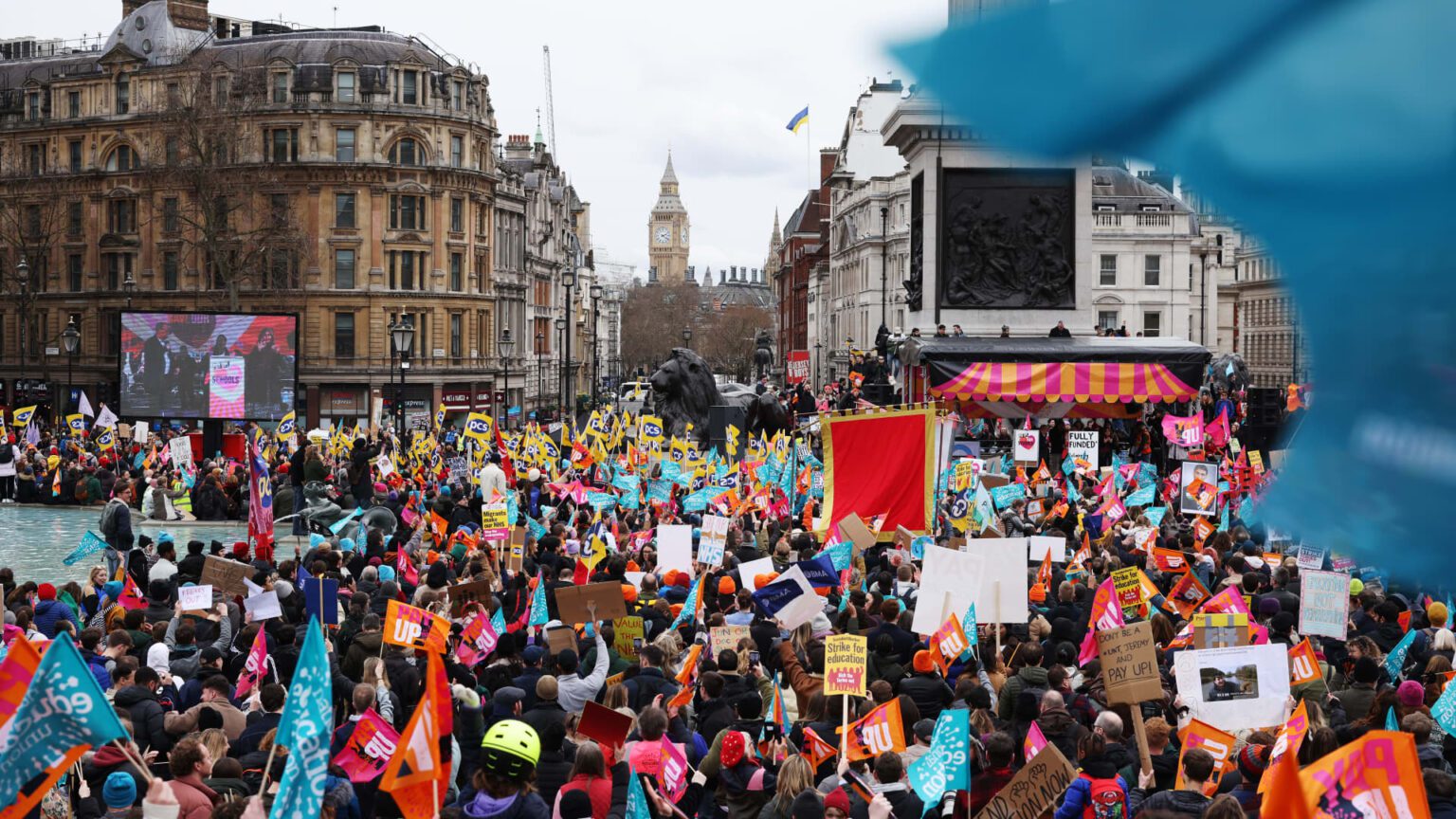Global Courant 2023-04-13 14:07:27
LONDON — The UK economy stagnated in February as widespread industrial action and persistently high inflation hampered activity.
Data on Thursday showed stable GDP in February, falling short of consensus expectations of 0.1% growth. Both the services and manufacturing sectors contracted, partly offset by a record 2.4% growth in construction.
This followed upwardly revised GDP growth of 0.4% in January, meaning output grew by 0.1% in the three months to the end of February.
Large-scale strikes have been carried out in recent months by, among others, teachers, doctors, civil servants and railway workers – members of the sectors most responsible for the decline in service output in February.
“There was anecdotal evidence, reported on monthly business surveys, to suggest that industrial action in February 2023 had a notable impact on different industries to varying degrees,” the Office for National Statistics said Thursday.
“These included the health sector (nurses and the ambulance service), the civil service, education (teachers and university lecturers) and the railway network.”
Jeremy Hunt, UK Chancellor of the Exchequer, holds the shipping box as he stands outside 11 Downing Street in London, UK, with his Treasury colleagues.
Bloomberg | Bloomberg | Getty Images
Commenting on the figures, UK Chancellor of the Exchequer Jeremy Hunt stressed that the country’s prospects were “better than expected”, stressing that the UK is “ready to avoid a recession thanks to the steps we have taken” , according to several news outlets.
The independent Office for Budget Responsibility no longer expects the UK economy to enter a technical recession in 2023 – defined as two consecutive quarters of contraction. The country’s fiscal position received a significant boost from falling gas prices.
This enabled Hunt to announce further fiscal support in its spring budget, which the Bank of England expects GDP to grow by about 0.3% in the coming years, even though Britain’s tax burden is at its highest level in 70 year remains.
Recession fears ‘likely to haunt the UK for some time’
Economists generally do not share Hunt’s optimism, especially as the central bank continues to aggressively hike interest rates to contain persistently skyrocketing inflation, which unexpectedly rose to 10.4% year on year in February.
Suren Thiru, economics director at ICAEW, said Thursday’s GDP figures “suggest that the economy has lost momentum as skyrocketing inflation and strikes continue to affect the main drivers of UK GDP, particularly services and industrial production.”
“Recession fears are likely to haunt the UK for some time to come as income gains from declining inflation and lower utility bills are substantially offset by rising taxes and the lagged impact of rising interest rates,” Thiru added.
Charles Hepworth, investment director at GAM Investments, said Hunt’s claim that the economic outlook looks brighter is “quite a suspension of disbelief” given the circumstances.
“Industrial strikes were the main driver of the stagnant growth in the UK during the month. March saw continued strikes and April sees no abatement, therefore we are likely to continue to see the depressing effect on any growth,” said Hepworth.
LONDON, ENGLAND – JANUARY 16: Protesters from various trade unions attend a demonstration against the UK government’s plans to restrict the ability of public sector workers to strike, outside Downing Street on January 16, 2023 in London, England. (Photo by Guy Smallman/Getty Images)
Guy Kleinman | Getty Images News | Getty Images
PwC Senior Economist Barret Kupelian noted that the prevalence of strikes in major sub-sectors of the economy means the UK is “likely to see a stop-start pattern going forward as well”, in line with month-on-month fluctuations in exports.
“The big story is that today’s release, combined with the revisions to economic activity, brings the three-month growth rate to about 0.1%,” Kupelian said. “The economy remains stagnant and economic activity is struggling to grow above pre-pandemic levels.”
The UK has now recovered to pre-Covid levels of production, the ONS confirmed, making it the last major economy to do so. Economists have cited several unique factors driving this sluggishness, such as Brexit-related trade losses and high levels of economic activity due to the prevalence of long-term illness.
Much of the population also remains mired in a cost-of-living crisis as inflation continues to vastly outpace wage growth, heightening the threat of further industrial action.
“With real incomes still continuing to fall, households facing significantly higher tax bills this year and interest rates set to rise further, it is difficult to see where a meaningful recovery in growth will come from. this will be the norm for the foreseeable future,” said Stuart Cole, chief macroeconomist at Equiti.
Bottom of the G-20 table
In its World Economic Outlook published Tuesday, the International Monetary Fund predicted that UK GDP will shrink by 0.3% in 2023, making it the worst performing group in a G-20 (Group of Twenty) that includes belligerent Russia is part of.
The UK economy is expected to fall short of Hunt’s two key fiscal rules: falling government debt and a borrowing rate of less than 3% of GDP over the next five years.
Offering a rosier medium-term outlook than its own previous estimates, the IMF now forecasts annual GDP growth of 1% in 2024, rising to 1.5% in 2028 – though this remains well below the OBR forecast that Hunt’s pledges Budget endorsed.
The IMF forecasts that the budget deficit will reach 3.7% of GDP in 2028, while the OBR forecasts only 1.7%.
Commenting on Tuesday’s IMF forecasts, Hunt stressed that UK growth forecasts had “upgraded by more than any other G-7 country”.
“The IMF is now saying we are on track for economic growth. By sticking to the plan, we will more than halve inflation this year, easing the pressure on everyone,” he added.








